"Ghent is an emblem for the Michelin Guide: three more stars" was the title of a piece in Belgian newspaper Het Nieuwsblad in November, when speaking of the climb to the Olympus of food of this beautiful Flemish town, which this year has even more étoiles from the Red Guide shining (only five years ago, there was only one remarkable restaurant for the French guide): all in all, five one-star restaurants and a two-star one, Vrijmoed in Vlaanderenstraat 22, which is named after its chef-patron, Michaël Vrijmoed, a pure gentenaar born in 1980, previously one of The Flanders Kitchen Rebels. To use the words of Michelin, "he matches complex and refined tastes with a soft spot for vegetables. He uses his creativity wisely. His dishes always have a soul. You’ll surrender". A very positive and well-deserved review.
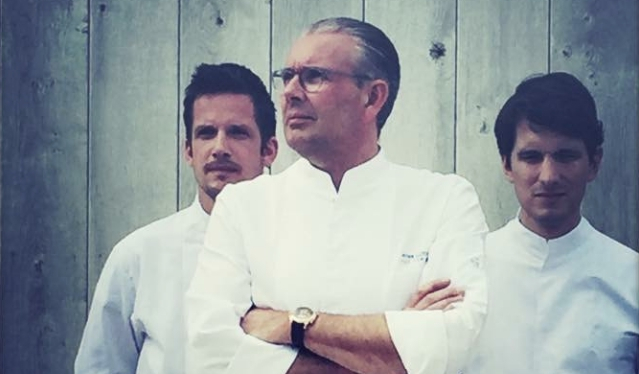
Peter Goossens (three stars at Hof Van Cleve) and, to his right, Michaël Vrijmoed, in a photo from a few years ago
The disciple of masters such as
Guy Van Cauteren (
't Laurierblad) and
Peter Goossens (3 stars at
Hof Van Cleve, where
Vrijmoed was sous chef), in March 2013 he opened his restaurant in the heart of Ghent. The name of the city comes from the Celtic word
Ganda, which means "confluent", as it is located on the confluence of rivers Leie and Scheldt. The restaurant got its first star only 8 months later. "
Young Flemish chef" in 2015 for
Gault Millau, which the following year awarded his restaurant for its "
Best veggie menu in Benelux".
We met him recently in Bergamo, at the
Hostaria inside Relais San Lorenzo, with chef
Antonio Cuomo, in an evening organised with the help of
Gualtiero Spotti. A while ago, the Flemish chef told the latter on
Cook_inc: «Since the age of 14, I felt I wanted to have a manual job, but at the time convincing my parents that I was to leave school wasn’t easy. So until I turned 19, I just attended some cooking classes and specialised in pastry making and chocolate while I finished my studies. Then came the great leap, when I had the chance to acquire experience with
Alain Ducasse in Monte Carlo».
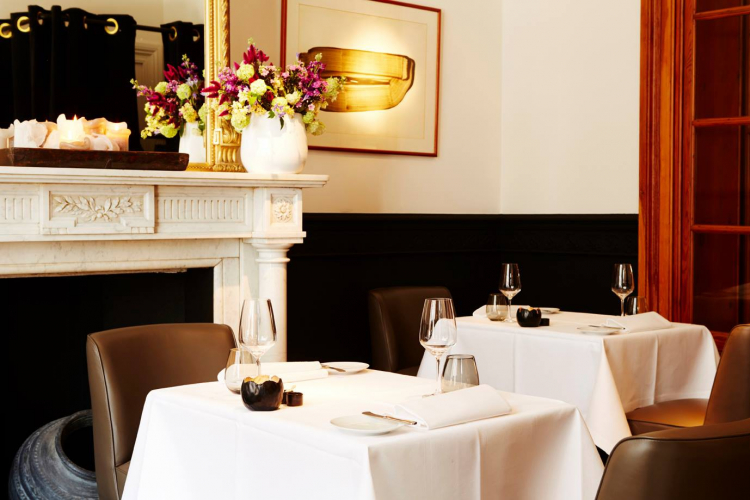
The dining room at Vrijmoed
The foundations of his cooking are French. However, as in the case of all the
Young Flemish Rebels, this imprinting is then filtered through the product culture (including raw products) that is typical of the
New Nordic Cuisine. Indeed the Flanders are the perfect geographical and cultural meeting point between this trend and the French school. His personal contribution is his special attention to seasonality and fresh raw materials.
During a previous visit to Milan, in the days of Expo [he also visits Italy as a tourist: he’s a passionate windsurfer and often goes to Sardinia]
he said: «Every week farmers and local producers supply us with raw materials. We also use the excellent fish from the North Sea, which is only 40 minutes from my restaurant (...) Vegetables have a main role. They are very important in my cuisine. I use them from starters to dessert». It’s interesting that a chef can offer different things, and even food for thought. With vegetables you can do much more and there are tasting menus that only have vegetables and interest even non-vegetarians. Flanders and Belgium can count today on a young generation of chefs with an added value: they bring local history on the plate, in unexpected shapes».
His favourite ingredient is hop sprouts («A very expensive classic in the first months of the year, in Benelux, given their price reaches 155 euros per kilo»,
Spotti). He serves them in many recipes:
Oxtail with hop sprouts, Hop with egg and watercress, Suckling pig with hop sprouts, and so on.
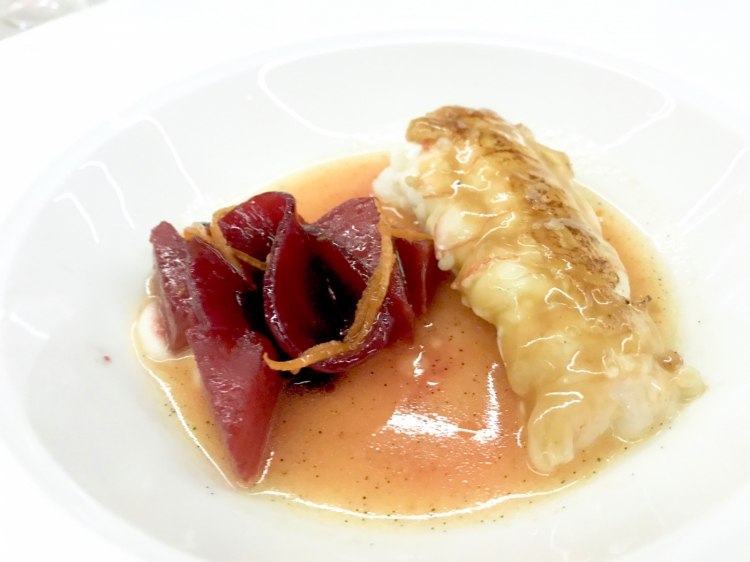
Scampi with beetroot wrapped in salt, orange confit, vinaigrette with vanilla and orange
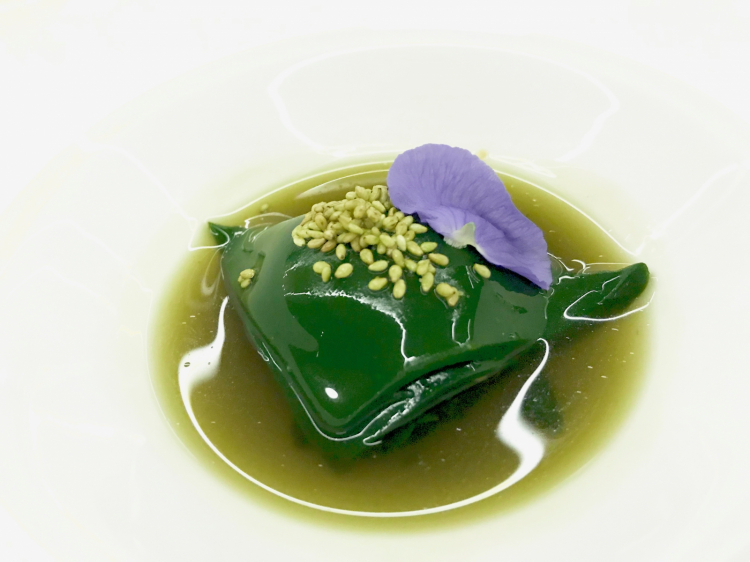
Ravioli with spinach, seaweeds and tofu, sesame, marinated spinach, consommé of Matcha tea
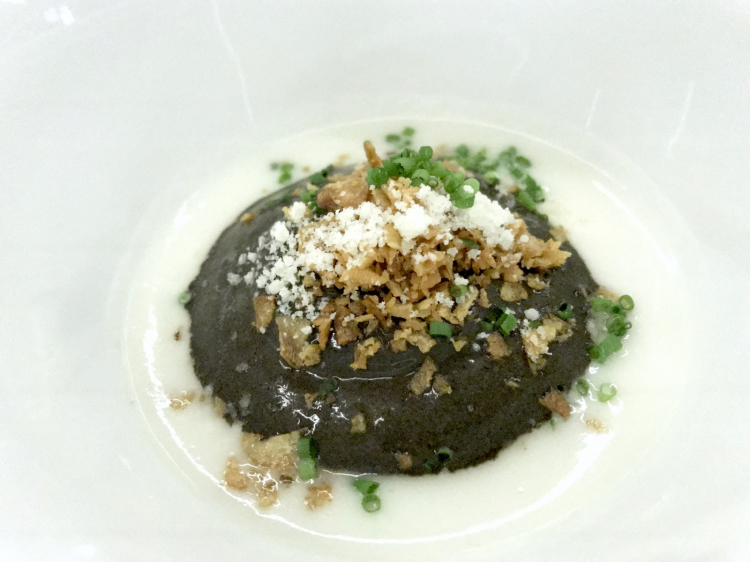
Jerusalem artichoke soup with black garlic foam and Parmigiano
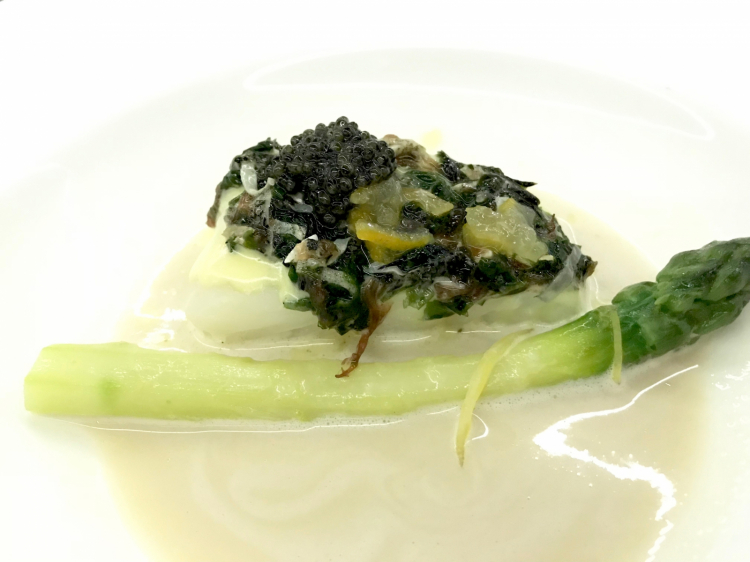
Poached and roasted skrei, seaweed salad, asparagus and yuzu confit
Vrijmoed’s ideas belong to a contemporary cuisine, which during our tasting in Bergamo he interpreted in rich, elegant dishes with a strong presence of chlorophyll but balanced to harmonise the fresh "green" flavour with the other components. As in Eel with green herbs, a dish in the menu in Ghent, in which the fatness of the meat is softened by the vegetal ingredients. The same applies to the Poached and roasted skrei, seaweed salad, asparagus and yuzu confit (skrei is an ancient cod - Gadus Morhua – caught in Norway from January to April). The delicious Jerusalem artichoke soup with black garlic and parmigiano, and before that the remarkable Ravioli with spinach, seaweeds and tofu, sesame, marinated spinach, consommé of Matcha tea.
Translated into English by Slawka G. Scarso